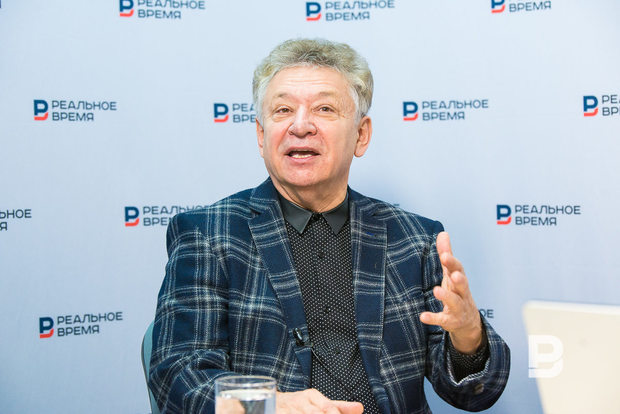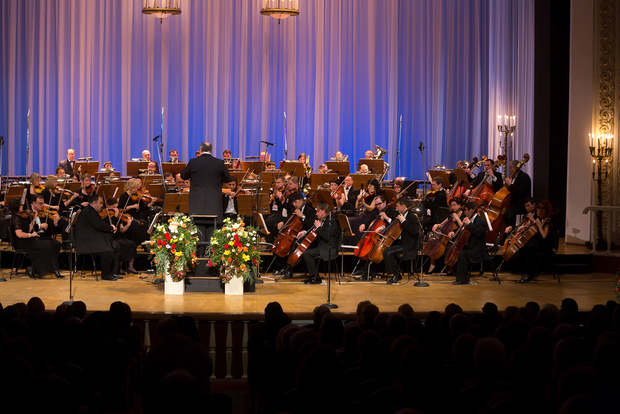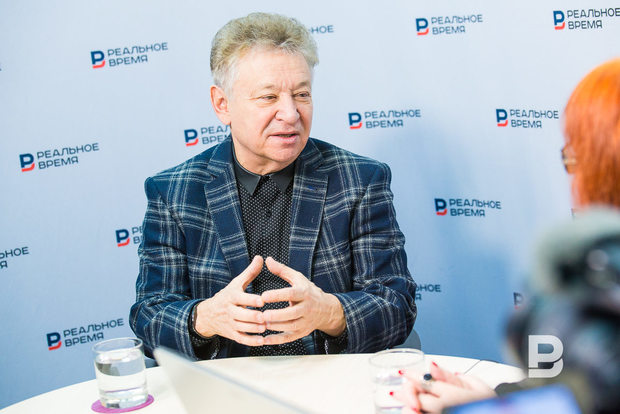Raufal Mukhametzyanov: ‘Foreigners buy tickets to opera 2 years in advance, Russians – 2 months beforehand'
Last weekend all tickets to the coming International Festival of Classical Ballet named after Rudolf Nuriyev, which is held annually to a full house in Kazan, were sold within literally one day. Meanwhile, the director of the Tatar Musa Jalil State Academic Theatre of Opera and Ballet Raufal Mukhametzyanov visited the editorial of Realnoe Vremya online newspaper. He explained why it happens so, told whether the crisis influenced the European tour and lifted the veil on the coming premieres of the theatre.
'Any crisis influences the work'
Mr. Mukhametzyanov, it is obvious that the readers of Realnoe Vremya are still full of impressions of Shalyapin Festival. For this reason, the first question is about the singers who were invited. They were over fifty this year. How was the casting? Probably it was very difficult.
Not exactly. Our century is an information age, and our workers excellently can get this information about the soloists and use it. Undoubtedly, no one cancelled the work of agents and contacts with theatres. We are closely included in this process, we work closely with artists. Everything will be fine if there are professionals, responsibility and motivation.
Did the economic crisis influence the relationships with your partners in the West?
It is obvious that any crisis influences, but at this moment there was no need to refuse any strategic things, and our partners also don't change the strategy. Tactically it can happen, the volume of the production reduces, but compromises are reached. And a mutually beneficial cultural cooperation is continuing. Difficulties appeared, of course. For instance, traffic jams arose on the Polish border, it affected because we have tours in Europe. But at present all problems are solvable.

The Opera has tours only in Holland and Belgium in recent years. Would you like to expand the geography?
We don't set a task to conquer the whole world. Europe is, indubitably, very favourable, it is close, and it is a plus. For instance, we have being invited to a festival to Thailand for five years, but now we cannot go there. The theatre elaborated a formula of work at home and on tours. The main work, undoubtedly, is carried out at home. On the other hand, tours are a necessary part of the work of any theatre. We give about 140 performances per year in Europe.
As far as I'm concerned, this number is greater in comparison with the Bolshoi Theatre.
Yes, we go after the Mariinsky Theatre. We have offers to go to, for example, Spain, Portugal, Mexico, Brazil. But then we have to leave the market, where we have already found a place. And our place will be occupied for sure.
But, for instance, Boris Godunov was successful in Spain.
Yes, it was. We managed to find a gap.
'Our task is to preserve the level of the performance'
There is an opinion that now it is not difficult to invite a star to an ordinary performance. What do you think about it?
We check the singers who we want to invite as well as the very singers of a certain class check the theatres they would like to go. It is a mutual responsibility. But it is impossible to invite a chore, orchestra, corps de ballet just making a call. These collectives are formed on a permanent basis. Meanwhile, singers are ready to travel throughout the world. There are mistakes, we also have had them when a singer came, sang orchestral songs and didn't correspondent to the class that had been mentioned. It is a stress. It is necessary to handle it with dignity. Our team can do it.
One more question about Shalyapin Festival. Next year this festival will celebrate its 35th anniversary. Will it have an impact on the programme?
I don't understand this question at all. The aesthetic of the very performances is to be high enough. Life is going on, performance gets older, changes, so everything weakens. But our task is to preserve the level of the performance and affect the audience. Only mastery helps.

The aesthetic of the very performances is to be high enough. Life is going on, performance gets older, changes, so everything weakens. But our task is to preserve the level of the performance and affect the audience.
As for the economy. Has the employees' salary been raised, or, on the contrary, has it been reduced?
We did not take any extreme measures. Naturally, we did not reduce salaries. But everything can be compared. Our product has the strongest competition. Musicians, singers, ballet soloists are in demand in the West. This is why if a talented student graduates from a college, conservatory, this information is known to the world musical space from the very beginning. And this student receives offers.
'We renewed a necessary set of instruments'
Gulnora Gatina, a soloist of the Kazan Opera, is taking part in performances in Italy. How do you think, will she be able to solidify in the West?
I cannot forecast, I'm not a seer. Today we are very pleased to see her in the world musical space. She is in demand, and it is wonderful. Her future life mainly depends on her too.
There is a very interesting question from our reader. What do you do with the decorations that have seen a long service?
We should carry out a raid on the artists' dachas. It is a joke, of course. When there was a deficit of things, retired objects were dismantled like hot cakes. But now there is nothing like this. Moreover, we have several sets of decorations for one performance. For instance, Swan Lake has luxurious decorations at home. But they are bulky. They do not fit on any stage. We have another set of decorations, it is no less beautiful, mobile and more suitable for tours. They support the beauty of a classical performance, the aesthetic, and they can be installed quickly. The same thing happens in opera. For instance, we plan a new staging of Nabucco by Verdi in 2018. So, we will preserve the old picturesque decoration for tours.
Who will be the director?
Yefim Maizel will.

'The brass section is the cheapest, the woodwinds are the most expensive. Bassoon is the most expensive instrument among the woodwinds.' Photo: Roman Khasaev
A question about the orchestra is the next one. How many instruments did you manage to renew? What instrument is the most expensive?
I can say that we don't 'wear expensive clothes'. Undoubtedly, we renewed a necessary set of instruments that is always renewed in symphonic orchestras. We don't renew string instruments, the classic variant is that string instrument players have their own instruments. But in the Russian space, there are some orchestras that renew the whole section of string instruments by means of the government. This group is very expensive because instruments that were created by masters several centuries ago are on the market.
I don't think they buy Stradivari or Guarneri's violins.
The government has such instruments in its fund, in principle. It gives them to celebrated concert soloists. But sometimes these instruments are found in orchestras too. If they give them, why should not we use it?
Anyway, what instruments are the most expensive?
The brass section is the cheapest, the woodwinds are the most expensive. Bassoon is the most expensive instrument among the woodwinds. Due to the President's grant, we renew our instruments every year. For instance, we cannot buy a new harp now. It is expensive. Harp costs about 4m rubles.

Speaking about Venera Gimadieva. Obviously, it is her fan who is asking this question. Could it be possible to hear the singer in the performance of our Opera?
I think so. We have Albina Shagimuratova, Gulnora Rakhimova, Venera Protasova among this type of singers. We will certainly invite Gimadieva, we work contacting the Bolshoi Theatre. For example, this year, the festival ended with a gala concert of the participants of Young Artist Opera Programme of the Bolshoi Theatre.
Very good singers participated in the gala concert. Will there be any contacts with them in the future?
We already have them in the database. We react in a trice.
The last question is traditional, it is about your plans. La Esmeralda ballet is the nearest premiere. What comes next?
It is a staging of the classical operetta Die Fledermaus, the great Russian opera The Queen of Spades, a new Tatar opera Syuyumbike. A tandem of composers Rezeda Akhiyarova and librettist Renat Kharis is working on it. Later, as I said, the premiere of Nabucco. And now we decide what romantic classical ballet we will stage.
Well, you have ambitious and interesting plans. We wish you would fulfil them.